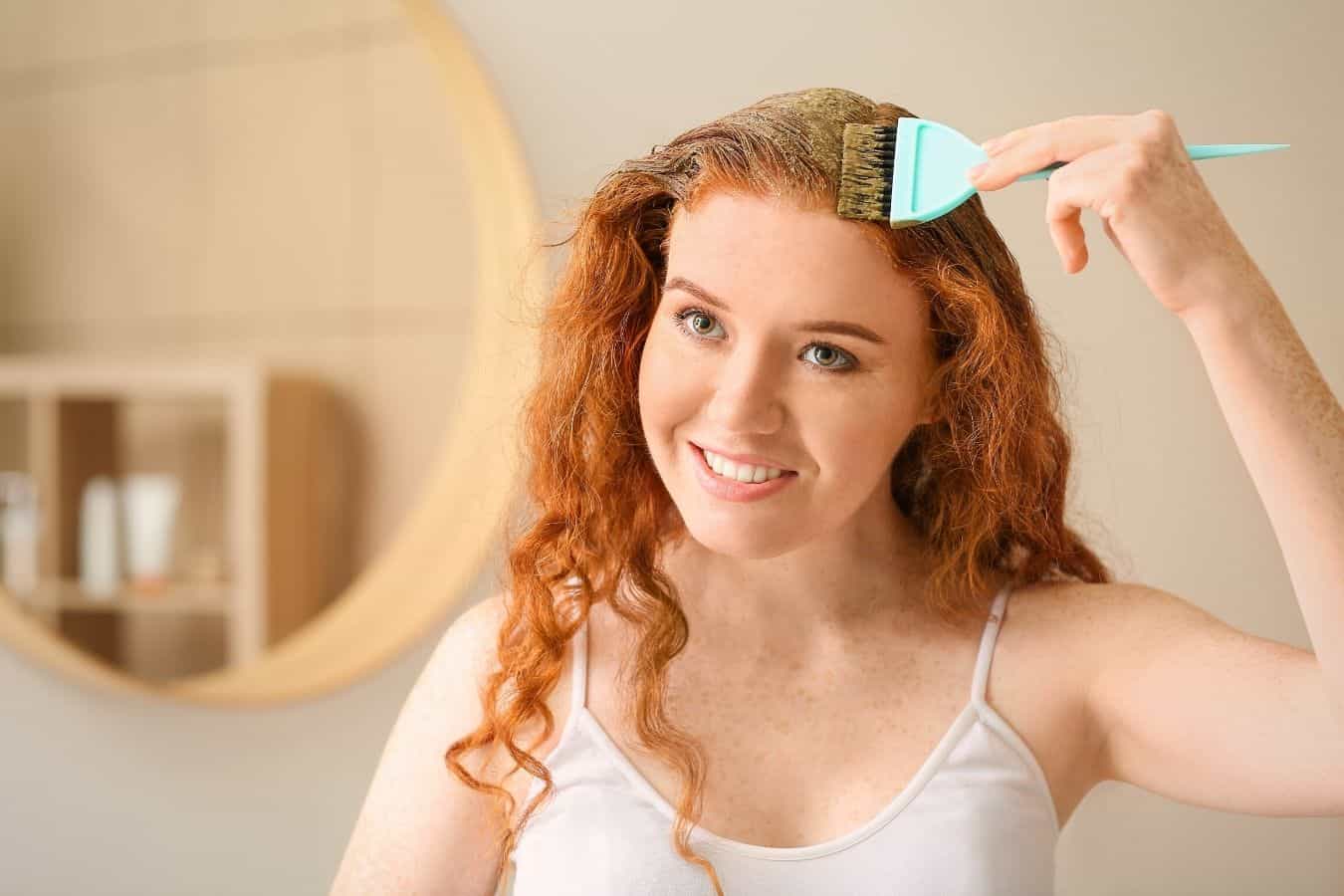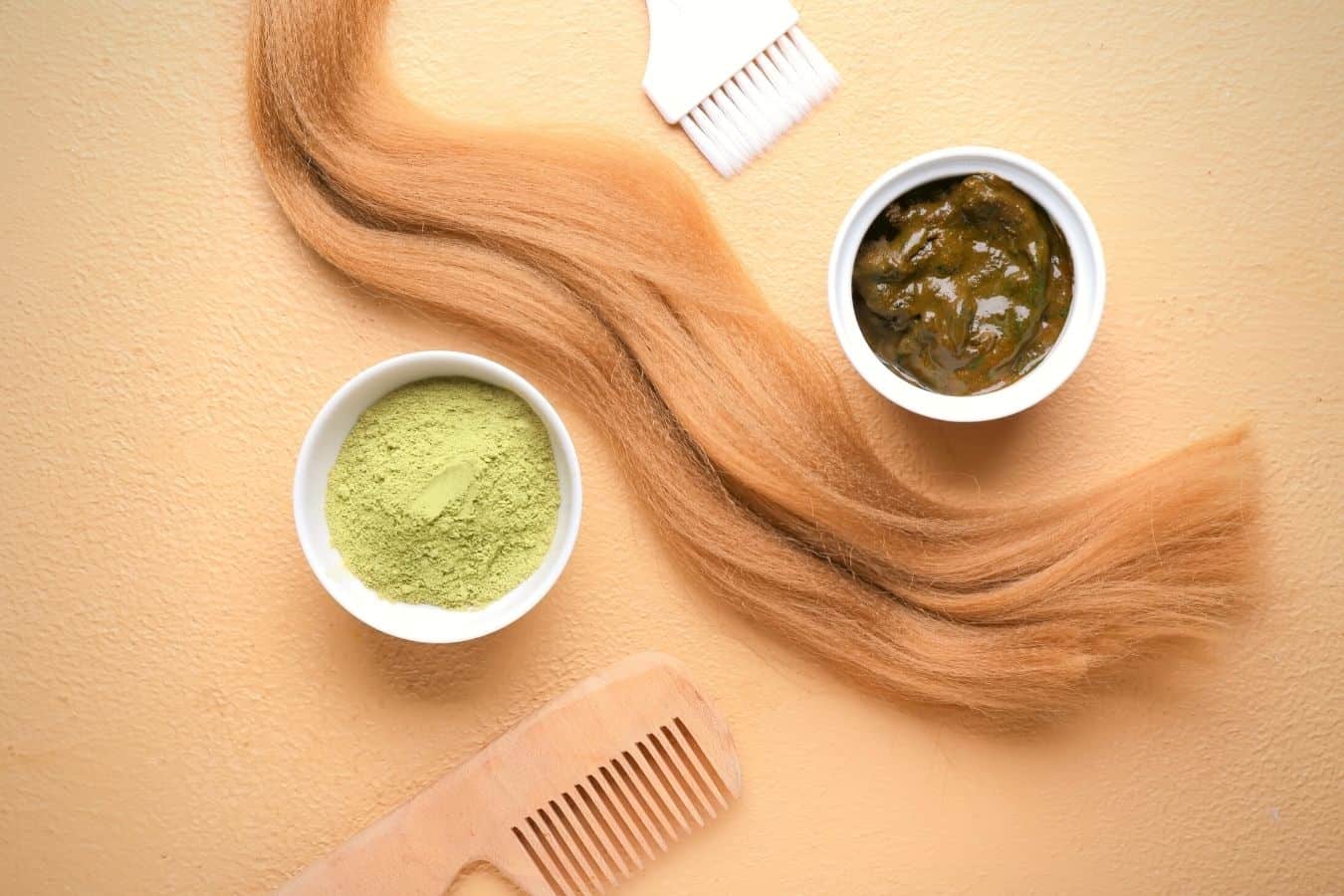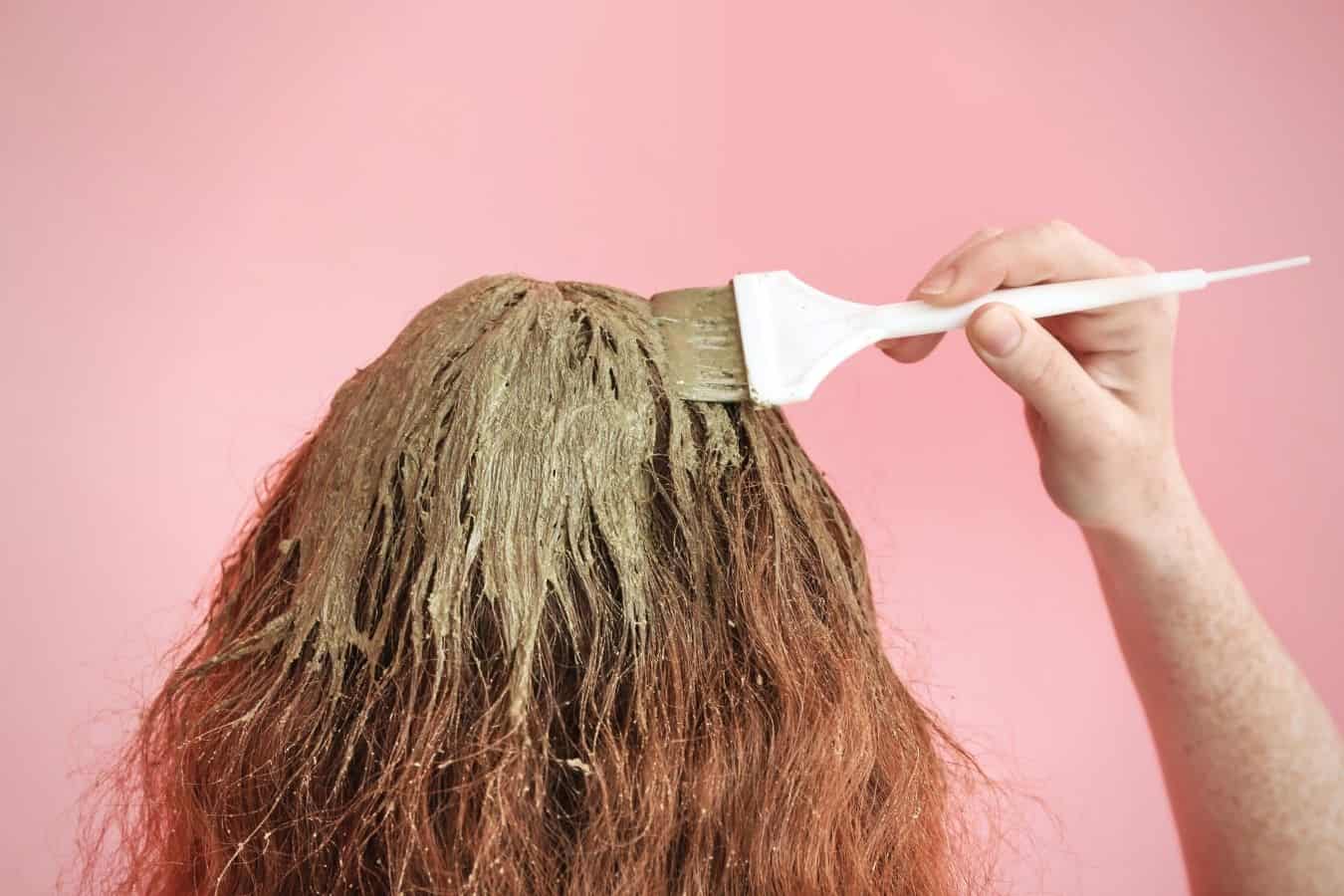Henna is a plant-based dye that offers a safer alternative to chemical dyes. But how long should you leave henna on your hair and what happens if you leave it on for too long? In this article, I answer all your questions.

Main Takeaways
- You shouldn’t leave henna on hair for longer than 5 hours
- Ideal timeframe is 2-4 hours
- Henna dye can cause hair to become very dry
- Follow up dye session with deep conditioners or oil treatments
How Long To Leave Henna On Hair
You should leave henna on your hair for no longer than five hours. This is generally considered the maximum absorbtion time and any longer than this may dry out your hair.
In fact, Henna expert Khadija suggests anywhere between 2-4 hours for the mixture to be adequately absorbed and to achieve a vibrant color result.
What happens if you leave henna on too long?
Leaving henna on for too long can be drying for your hair and scalp and could potentially also risk weakening your hair strands.
This is because henna draws out moisture from the hair and the longer the product stays on the more it tends to re-hydrate itself.
If you have previous experience with henna, you’ll have noticed it eventually becomes dry and clay-like once there’s no moisture left.
Luckily, the drying feeling doesn’t usually last too long and in general, henna is a safe alternative to most commercial hair dyes on the market today. This is because it contains no chemicals or harsh dyeing agents.
So no, you won’t cause serious damage to your hair if you do leave henna on for too long, just keep in mind that you may need to do a moisturizing conditioning treatment afterwards.
Can I Leave in Henna Overnight?
Leaving henna on your hair for the duration of the night is safe to do so but be warned that it may dry out your hair significantly.
It is believed that the final color result will be bolder, and the shade will deepen, but experts say that the effects of henna usually wears off after five hours.
If you are looking for a more vibrant color, make sure you do proper research on colors before dyeing your hair. This is because the final shade is actually determined by the mixture itself and the ingredients added to the henna.
For example, indigo works better for darker tones and cassia is good for strawberry shades of blonde.
If you do want to leave in henna overnight, do a deep conditioning treatment beforehand or follow up with an oil treatment.
Can Henna Damage Your Hair?

The good news is that henna cannot damage your hair in the same way that commercial, synthetic hair dyes often do.
Henna is different to store-bought dye in that it is natural and is free from harmful chemicals and ingredients.
It, therefore, won’t roughen or strip your hair’s cuticle before depositing the color.
Unlike most chemical dyes which can only be applied after 8-10 weeks, henna is safe enough to re-apply immediately.
Technically, you can apply henna daily, but we don’t recommend that you leave henna on for too long or too frequently as that may result in scalp sensitivity and dryness.
Although henna doesn’t necessarily damage the hair, there are disadvantages.
These include:
- Color won’t be as vibrant as with commercial dyes
- You can’t bleach hair with henna
- Hair can become dry
- Henna is permanent and difficult to remove
- Can stain skin and clothes
- Color may be affected by heat tools
- May cause an allergic reaction
- Could contain impurities
How Often Should I Dye My Hair with Henna?
You should reapply henna hair dye every 3-4 weeks for full coverage.
This is however based on how the health of your scalp and what condition your hair is in.
If you feel you have dry or damaged hair, we recommend applying the natural dye less frequently to allow for your hair to recover.
Your hair dye is the most visible at the 5-week mark and allowing your strands time to strengthen and grow during that period would help you to achieve healthy hair.
It is worth noting that your first application with henna may not leave you with the hair color you desire. In this case, it’s OK to build up the tone and re-apply henna the next day.
Once you get to your desired shade, you should only reapply every 3 to 4 weeks.
How to Apply Henna on Hair
What You’ll Need:
- Henna powder (1/2 cup/50g)
- Water (1/4 cup/60ml)
- A non-metallic bowl for the mixing
- Application brush
- Gloves
- Plastic wrap or towel
- Vaseline or oil
- Cleaning wipes or cotton pads
Prep:
- Wash and dry your hair before applying the henna. Do not condition.
- Mix the henna powder with lukewarm water. Mix thoroughly until you reach a medium consistency that is not too thick.
- Cover your clothes with a towel or plastic wrap
- Apply Vaseline or oil around your hairline to avoid staining on your face
Instructions:
- Section your hair into manageble pieces
- Put on the gloves and apply the henna starting from the top of the crown
- Work your way sideways or downwards in sections
- Start from the root and end up at the ends of the hair
- Ensure all parts of your hair have been covered in the paste
- Shape your hair upwards in a bun to hold it in place
After the application is complete and you have let the henna settle for at least 2-3 hours, rinse off the formula thoroughly.
Apply a conditioner or hair treatment to offer a source of moisture and nourishment to your scalp and hair.
Use a deep conditioner after applying the henna to give your hair a hydration boost and make sure you check that your henna is within the expiration date before using.
Who Should Dye Their Hair with Henna?

The great news is that henna is safe to use on all kinds of hair and all colors. As well as achieving vibrant color, it helps to condition and strengthen your locks with each application.
There is henna available for blondes, redheads, and brunettes.
It is also suitable to use to cover gray hairs. You will therefore find root touch-ups are an effortless process.
While this natural dye has a red tone base, you’re able to adjust the shade to suit your specific hair color.
This can be done by simply adding henna with a few other herbs. For example, for those looking for a brown or black shade, combine the henna dye with indigo.
Henna is generally safe to use and is suitable for all hair types. However, we do recommend applying a test patch to determine if it is safe to use on your skin and to determine the right color.
6 Benefits of Using Henna
Henna has a host of other benefits for your hair and skin which include:
1. Henna Helps to Improve Hair Growth
Some natural herbs have the ability to jumpstart hair growth.
The natural properties found in henna have also been proven to help encourage hair growth in individuals and offer a source of nourishment.
2. Has the Ability to Reduce Hair Fall
Did you know that the unique combination of henna powder mixed with mustard oil makes for an effective natural remedy to combat hair fall and hair thinning?
So along with enjoying vibrant color you can introduce this natural remedy into your hair care routine to help prevent hair loss.
3. It is Known to Prevent Dandruff
Dandruff is a common condition experienced by many people all over the world.
The condition is often worsened over winter as you are more inclined to wash your hair with warm water and this could lead to your scalp becoming drier and flakier.
Studies have shown that applying henna regularly on your hair can lead to preventing and treating the occurrence of dandruff.
You may also find that it will delay the period of time before the dandruff possibly returns.
4. Helps to Control Scalp Itchiness
Henna has both anti-fungal and anti-microbial properties that help to cool and soothe an irritated scalp.
This is great news for those who suffer from a sensitive or itchy scalp and still wish to color their hair with a natural alternative to harsh chemicals.
5. It’s All Natural
If you are reluctant to use chemicals on your scalp but still want to cover your gray hair or transform your hair color henna is the perfect solution.
Many modern hair dyes have strong chemical additives that may lead to damaging your hair and health.
Some studies have suggested there may even be a link between hair dye and certain cancers. Pure henna is considered to be one of the safest hair dye options available on the market today.
6. Helps to Repair Split Ends
Dry and damaged hair is often more susceptible to creating split ends.
Henna helps to nourish and condition your hair during the coloring process so you can reduce the risk of damage to your hair.
How Do You Make Henna Dye Darker?
One of the great advantages of using henna as hair dye is the ability to determine the shade of color.
You can even make it darker or lighter according to your preference.
If you plan to leave the henna on for too long in the hopes that it can result in a darker shade you will be left feeling disappointed as this will not be the case.
The final color is determined by the mixture itself rather than the duration of the application.
For example, if you are very fair and would like to create a strawberry blonde hair shade, we recommend adding a small amount of henna to a large amount of cassia.
If you’re looking to create a blue-black shade or chocolate shade of henna we recommend adding indigo to the mixture.
For an intense, vibrant red color we suggest adding a small amount of brandy to the henna. For a darker shade such as brown or black, simply add a small amount of coffee or tea.
Just be careful of mixing henna with oil. Although it’s not harmful, the oil may block the color molecules and not give you the color result you were hoping for.
Should I Wash My Hair Before Using Henna?

I find that henna works effectively on clean hair rather than on wet hair.
I would recommend washing your hair prior to performing an at-home coloring process. This ensures your hair is clean and free of dirt and oils.
Shampoo helps to remove any impurities and mineral build-up in your strands. This will allow the henna to attach more easily to your locks.
If you have any form of dirt or build-up on your hair, it could act as a barrier and prevent the henna from being adequately absorbed into your strands. This could in turn result in a patchy hair color.
For the most effective results, allow for your hair to be dry or even damp. Just don’t saturate your hair with water as this could affect the coloring process.
So, How Long To Leave Henna On Hair?
According to expert advice, you are OK to leave henna on your hair for up to 5 hours. Anything shorter than 2 hours will result in a lacklustre color and anything above 5 hours will make no difference.
Leaving henna on your hair for too long may causing dry hair and dry scalp. However, as henna is a natural dye, it won’t cause too much damage. Ensure you moisturize your har before and after a henna dye treatment, using deep conditioners or oils.
References
What Is Henna?
https://www.thehennaguys.com/pages/what-is-henna
Is Henna Hair Dye a Bad Idea? Here’s What the Experts Have to Say
https://www.healthline.com/health/beauty-skin-care/disadvantages-of-henna-for-hair
Is Henna Hair Dye a Bad Idea? Here’s What the Experts Have to Say
https://www.healthline.com/health/beauty-skin-care/henna-benefits-for-hair
Is Your Hair Becoming Dry After Applying Henna? Try These Hair Masks
https://www.news18.com/news/lifestyle/is-your-hair-becoming-dry-after-applying-henna-try-these-hair-masks-5551219.html
Hair Dyes and Cancer Risk
https://www.cancer.org/cancer/cancer-causes/hair-dyes.html
What Is Cassia?
https://www.thespruceeats.com/what-is-cassia-1807003
Disclaimer: This site is not intended to provide professional or medical advice. All of the content on LovedByCurls.com is for informational purposes only. All advice should be followed at your own discretion. Ingredients may change at any time so always check the product label before using. Check our full disclaimer policy here.
